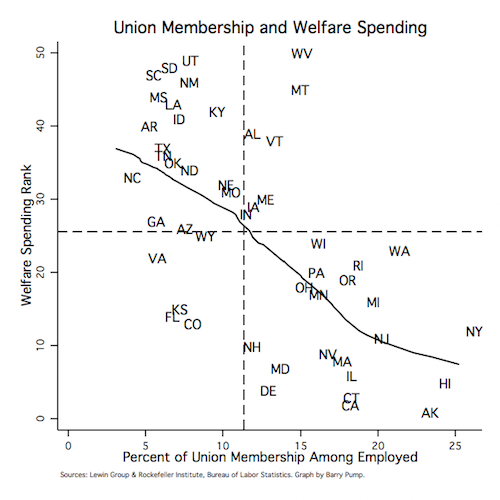Matthew Yglesias's Blog, page 2408
February 25, 2011
Universal Health Insurance Boosts Entrepreneurship
If we didn't have a giant tax subsidy for employer-provided health insurance, then the health insurance market wouldn't work for anyone under the age of 65. But insuring the majority of our working-age population through a giant tax subsidy for employer-provided health insurance is a double-whammy to entrepreneurship. On the one hand, it means that people who don't work for firms that provide insurance are being taxed to subsidize those who do. And on the other hand, it means that failing to work for such a firm basically shuts you out of the insurance market if you're at risk of needing health care.
So via Ezra Klein here's an interesting study from Robert W. Fairliea, Kanika Kapurb and Susan Gates that attempts to measure the extent of this "job lock" by comparing the business ownership rate of males just-before and just-after they become eligible for Medicare:
We use difference-in-difference models to estimate the interaction between having a spouse with employer-based health insurance and potential demand for health care. We find evidence of a larger negative effect of health insurance demand on business creation for those without spousal coverage than for those with spousal coverage. We also take a new approach in the literature to examine the question of whether employer-based health insurance discourages business creation by exploiting the discontinuity created at age 65 through the qualification for Medicare. Using a novel procedure of identifying age in months from matched monthly CPS data, we compare the probability of business ownership among male workers in the months just before turning age 65 and in the months just after turning age 65. We find that business ownership rates increase from just under age 65 to just over age 65, whereas we find no change in business ownership rates from just before to just after for other ages 55–75. We also do not find evidence from the previous literature and additional estimates that other confounding factors such as retirement, partial retirement, social security and pension eligibility are responsible for the increase in business ownership in the month individuals turn 65. Our estimates provide some evidence that "entrepreneurship lock" exists, which raises concerns that the bundling of health insurance and employment may create an inefficient level of business creation.
This kind of study can't capture the impact of the differential taxation, so it's underestimating the total scale of the effect.


Unions and Social Welfare Spending
Barry Pump shows that state level union density is uncorrelated with progressive taxation but reasonably well correlated with social welfare spending:

It would be interesting to know more about this. There's a difference, after all, between how generous a program is and how expensive it is. One program might hand out money to poor people. Another program might hand out money to poor people if and only if they pass regular drug tests and criminal background checks. The latter will likely be more expensive, since it's harder to administer, but the former seems more generous by any reasonable standard. Unions have reasons to lobby for generous, efficient programs (like Social Security, which labor is a key backer of) but also have reasons to lobby for making programs labor-intensive and letting service providers capture as large as possible a share of the appropriations. It would be interesting to see evidence on which effect dominates. Maybe a chart with "personnel costs as a share of state expenditures" on the y axis would be illuminating.
It also might be interesting to see this done with fewer states. The chart as it exists seems to me to be largely showing that southern states have both "right to work" laws and low levels of spending, which seems like a clear case of joint causation by the underlying malady of right-wing political culture.


Nevada's Marginal Prostitution Industry
Harry Reid inadvertently set off a firestorm of controversy by suggesting that Nevada criminalize prostitution. Interestingly, what Annie Lowrey explains is that legal prostitution in Nevada is actually just a totally marginal phenomenon with no real impact one way or the other:
For starters, legal prostitution, which occurs only within the highly regulated brothels, is not a big contributor to Nevada's economy one way or another, despite the outsize attention it gets. State law allows counties with fewer than 400,000 residents as of the last census to decide whether to allow houses of prostitution. Ten of Nevada's 17 counties do. Washoe County, home to Reno, is not one of them. Clark County, home to Vegas, could not even if it wanted to, as it is too big. The 24 brothels currently operating mostly reside in sparsely populated northern Nevada, around the I-80 corridor.
For context, it's useful to look at a map and you'll see that the I-80 corridor is nowhere near Vegas:

These places are probably more accessible to Salt Lake City than to Nevada's main population center. The interesting hypothesis is that the tiny legal industry matters as a marketing issue:
These businesses generally cater to tourists and truckers. "It is important symbolically, just because it adds to the 'What happens in Vegas stays in Vegas,' Sin City environment," says Barb Brents, a sociology professor at the University of Nevada-Las Vegas, and an expert on the sex trade. "But it's really a very small industry." Overall, Nevada's brothels employ about 1,000 people, total, and have combined revenues in the low tens of millions of dollars per year.
I do wonder if the steady spread of legal gambling options in other states will, over time, push the state toward more widespread legalization of prostitution. Casinos alone used to suffice to make a place "Sin City" but casinos are spreading so maybe bringing prostitution to Washoe or Clark County will be necessary to maintain the state's comparative advantage.


Fast Food Optimism

The best advice I can give anyone trying to lose weight is to look up how many calories different foods actually have since the results are often not intuitive. The oatmeal you make at home is a low-calorie offering, but as Mark Bittman explains the McDonald's version is very much not:
The aspect one cannot argue is nutrition: Incredibly, the McDonald's product contains more sugar than a Snickers bar and only 10 fewer calories than a McDonald's cheeseburger or Egg McMuffin. (Even without the brown sugar it has more calories than a McDonald's hamburger.)
The bottom-line question is, "Why?" Why would McDonald's, which appears every now and then to try to persuade us that it is adding "healthier" foods to its menu, take a venerable ingredient like oatmeal and turn it into expensive junk food? Why create a hideous concoction of 21 ingredients, many of them chemical and/or unnecessary? Why not try, for once, to keep it honest?
I think that sometimes people need to be just a bit more patient with the operation of things. I see the McDonald's oatmeal saga as in some ways optimistic. The first piece of good news about McDonald's oatmeal is that, as a marketing strategy, they clearly think there's money to be made in selling people food that they perceive as healthier than the existing McDonald's options. The second piece of good news about McDonald's oatmeal is that, as a matter of corporate policy, McDonald's discloses extensive nutritional information about the food they sell. Thanks to the second piece of good news, we know that the promise of healthy McDonald's oatmeal is a lie. And thanks to the Affordable Care Act, more extensive and aggressive calorie information will be coming.
The answer, as it pertains to McDonald's, is that McDonald's is a very big and very successful firm that's very good at marketing unhealthy food. So faced with rising demand for healthier options, they give us unhealthy food + marketing. That's their business and it's rare for large successful businesses to change their spots. What happens, sometimes, is that they become less successful and new entrants displace them. So the real question for McDonald's, I think, is whether there are new and growing dining establishments that are responding to the same pressures by offering food that's actually healthy. I eat more and more at Chopt Salad and Mixt Greens both of which are much smaller today than McDonald's, but both of which seem to me to be adding new locations aggressively.


How To Run America Like a Business: Get Rid Of All The Old People

Jamelle Bouie Sarah Lacy's piece on why America can't "function like a fiscally responsible company" as a good example of "why tech writers should stay away from politics."
I endorse his critiques, but there's really a deeper issue here. A state is fundamentally an ethical enterprise aimed at promoting human welfare. A business isn't like that. If you're trying to look at America from a balance-sheet perspective the problem is very clear. It's not "entitlements" and it's not "Social Security" and it's not "Medicare" and it's not "health care costs" it's the existence of old people. Old people, generally speaking, don't produce anything of economic value. They sit around, retired, consuming goods and services and produce nothing but the occasional turn at babysitting. The optimal economic growth policy isn't to slash Social Security or Medicare benefits, it's to euthanize 70 year-olds and harvest their organs for auction. With that in place, you could cut taxes and massively ramp-up investments in physical infrastructure, early childhood education, and be on easy street. The problem with this isn't that it wouldn't work, it's that it would be wrong, morally speaking.
Now obviously an idea like raising the retirement age to 70 isn't as wrong as mandatory euthanasia at the age of 70. But by the same token, it doesn't "work" as well at boosting per capita GDP or cutting down on American red ink. And both ideas exist on a continuum of the same tradeoff—bolstering the living standards of old people is an economically inefficient undertaking that we sentimental human beings find ethically appealing. That's not to say that the spot on the continuum occupied by current policy is the best possible way to make the tradeoff. But it's simply to dramatize the nature of calculus we're talking about. As a "business strategy" it's ridiculous—on a par with preserving the natural beauty of the Grand Canyon or having the military pay health care costs of soldiers who are too injured to fight—but that's because it's not a business strategy.


Freedom-Talk in Colonial Georgia

Here's another joint from Alan Taylor's American Colonies, this time illustrating that the use of freedom-talk as a cover for violent hierarchical authoritarian nationalism is nothing new:
The Georgia dissidents rallied behind the revealing slogan "Liberty and Property without restrictions"—which explicitly linked the liberty of white men to their right to hold blacks as property. Until they could own slaves, the white Georgians considered themselves unfree. Such reasoning made sense in an eighteenth-century empire where liberty was a privileged status that almost always depended upon the power to subordinate someone else. Under increasing pressure from a Parliament solicitous of the slave trade, in 1751 the trustees capitulated, permitting slavery and surrendering Georgia to the crown. Georgia received the usual tripartite arrangement of an elected assembly, a crown-appointed council, and a royal governor.
It's a very interesting quirk of rhetoric. Freedom-talk tends, in practice, to have very little to do with any respectable notion of freedom.


Education and Social Progress
Adam Serwer, L Eckstein unearths a series of charts on the state of black America put together by W.E.B. Dubois for a presentation at the 1900 Exposition Universelle in Paris:

As you can see here, a staggeringly high proportion of Atlanta University graduates were becoming teachers. As Serwer says, it was part of a larger trend in which "Jim Crow was funneling the most educated black minds into a very limited set of professions."
This and the parallel set of facts for women is, I think, an unduly neglected trend in recent American life. A related point is that you tended to see relatively high-performing K-12 education systems in Communist countries. Jim Crow, patriarchy, and the economic policies of Fidel Castro are all ways to artificially increase the appeal of a teaching career relative to other options. This is not a good reason for a country to adopt Communism or arbitrarily exclude women from careers as lawyers or bankers, but it does mean that the expanded labor market opportunities for women and minorities over the past 40 years has been a substantial negative shock to the human capital of K-12 schools. The qualities that make someone the best 6th grade English teacher in the world probably aren't identical to the qualities that make someone the best public relations executive in the world. But they're not totally uncorrelated either. When teaching was the only thing many classes of smart ambitious people could do, it was easier to run a high-performing school.


Freedom Loving Conservatives Proposing Additional Draconian Immigration Measures

(cc photo by Ken Lund)
Eliza Gray reports on the sweet scent of liberty in the great state of Arizona:
At a Tuesday hearing that lasted until 2.30 a.m., all of these measures passed the Appropriations Committee, along with an even more drastic "immigration omnibus" bill. Earlier this week, Arizona Republic columnist E.J. Montini called the omnibus proposal "SB1070 on steroids"—a reference to last year's controversial law requiring that immigrants carry identification at all times, which is currently being challenged in court by the Obama administration.
The omnibus bill would require K-12 schools (public, private, and home school) to report undocumented students to law enforcement. "Without a doubt, if this bill passes," the Arizona ACLU's Executive Director Alessandra Soler Meetze told me, "classrooms will be closed to students without legal status." It would also require a 30-day minimum jail sentence for any undocumented immigrant caught driving a car. Anyone who knowingly lives in public housing with an undocumented immigrant, including a family member, would be forcibly evicted. Business licenses would be suspended for any employers that do not check the legal status of their workers with the federal E-verify system.
Unauthorized migration from Mexico has a documented, verifiable, and theoretically explained downward impact on the wages of recent immigrants from Mexico. But obviously it's not non-citizen authorized immigrants from Mexico who are pushing this agenda. Nor is it Mexico-born naturalized citizens of the United States, nor native born Arizonans of Mexican ancestry. Instead this insane and inhumane crusade is being spearheaded by people who benefit economically from an influx of people with complementary skills. It's madness, and it's tragic.


Mitt Romney Pride Day
I lived in Massachusetts and voted for Mitt Romney in the 2002 gubernatorial election. I'm proud that I did, largely because I'm by no means convinced that a conventional machine Democrat like Shannon O'Brien could have shepherded a path-breaking universal health care law into being. So I'm glad to see Maggie Haberman report that Romney himself is starting to show some pride:
Mitt Romney rejected Mike Huckabee's call for him to admit that the "RomneyCare" health care program failed, instead saying he's "proud" of "getting everyone covered" when he was governor of Massachusetts.
"Mitt Romney is proud of what he accomplished for Massachusetts in getting everyone covered," Romney's spokesman, Eric Fehrnstrom, told the Boston Globe, in the first direct response Team Mitt made to Huckabee's criticism of the health plan in his new book.
I'd love to imagine a scenario in which Romney gives up on his impossible dream of securing a GOP presidential nomination and recognizes that the Affordable Care Act, like the Commonwealth Care initiative, is worthy effort to tackle a very complicated problem that's going to need continual tweaks over the years. The best hope the country has is for some smallish faction of moderate Republicans—the Romneys, the Browns, the Kirks—to start breaking with repealer orthodoxy and start proposing concrete constructive changes to the new framework. The political system is exhausted by the thought of additional health care reform, but we actually need much more reform than last year's law gives us.


Do Closed Primaries Cause Political Polarization?
As a followup to my skepticism that William Galston and Elaine Kamarck are right to think that open primaries will empower moderates, let me note some evidence that comes my way via John Sides:
— Eric McGhee, Seth Masket, Boris Shor, and Nolan McCarty find "The results of this analysis suggest that the openness of a primary election has little effect, if any, on the partisanship of the politicians it produces."
— And Eric McGhee alone "This study has examined the available roll-call evidence to determine the effect that open primaries have on representation. The results suggest that most of these systems have little effect on moderation."
— Stephen Ansolabehere, John Mark Hansen, Shigeo Hirano and James M. Snyder find "The role of primaries as a venue for robust contestation, however, was short-lived, as the competitiveness of federal and statewide primaries decreased sharply starting in the 1940s."
Primary challenges are rare, and turnout in primaries is low. Those reasons, it seems to me, explain why primary system dynamics in practice have few consequences for political outcomes. I think the reform that anti-polarizers are looking for is multiple member House constituencies so that we'd have one or two Republicans from New York City, a smallish block of white southern Democrats, a conservative Mexican-American from Texas, etc. Then I think you might find that voting patterns became a bit less systematically correlated.


Matthew Yglesias's Blog
- Matthew Yglesias's profile
- 72 followers



